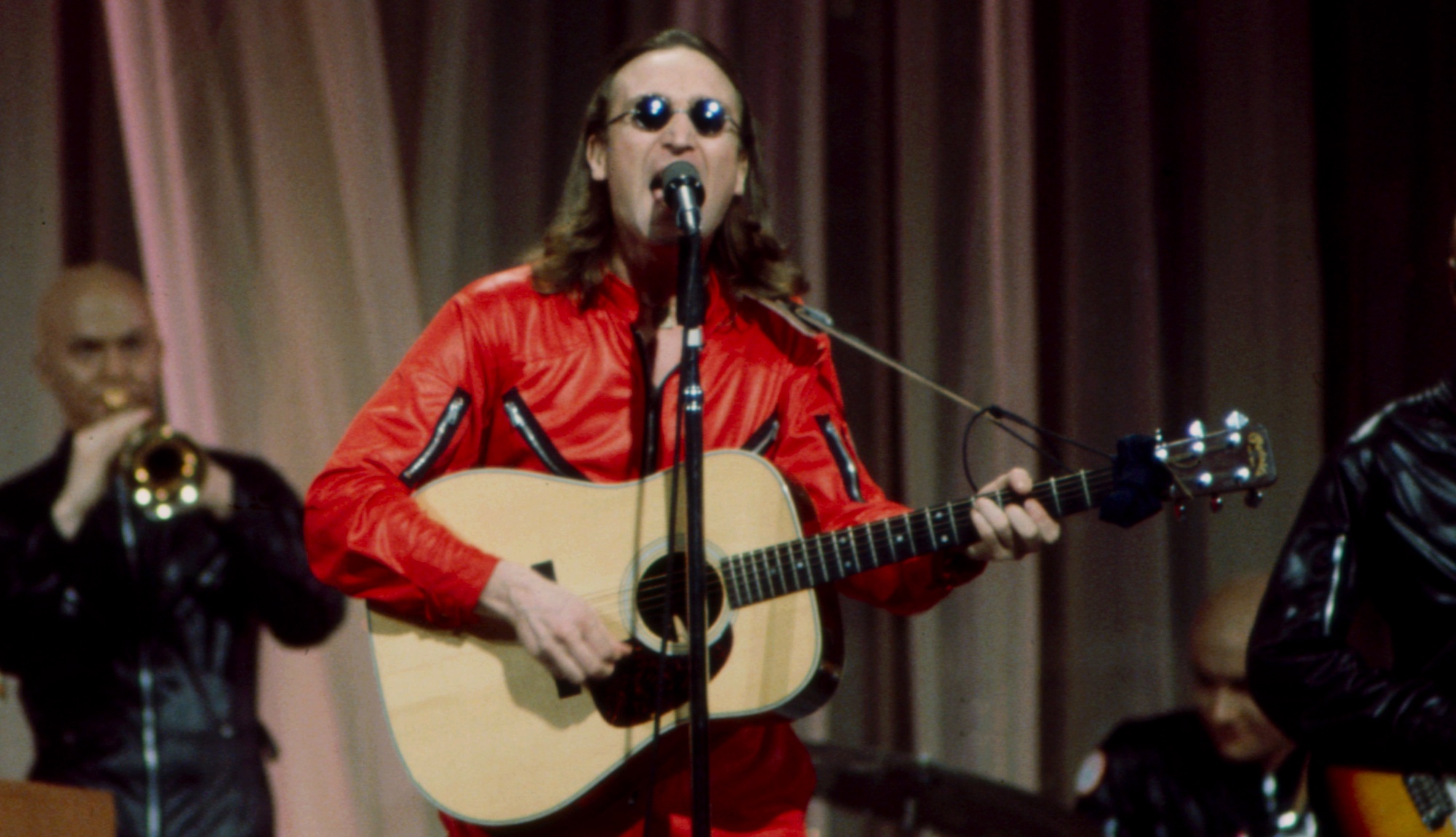“With this band, you learn not to make plans”: Dave Navarro on his fight to beat Covid, and the Jane’s Addiction reunion that – little did he know – was about to come off the tracks
In an interview that took place just a few weeks before Jane’s Addiction’s onstage fight on September 13, Navarro explains why he reconnected with the original lineup in the first place
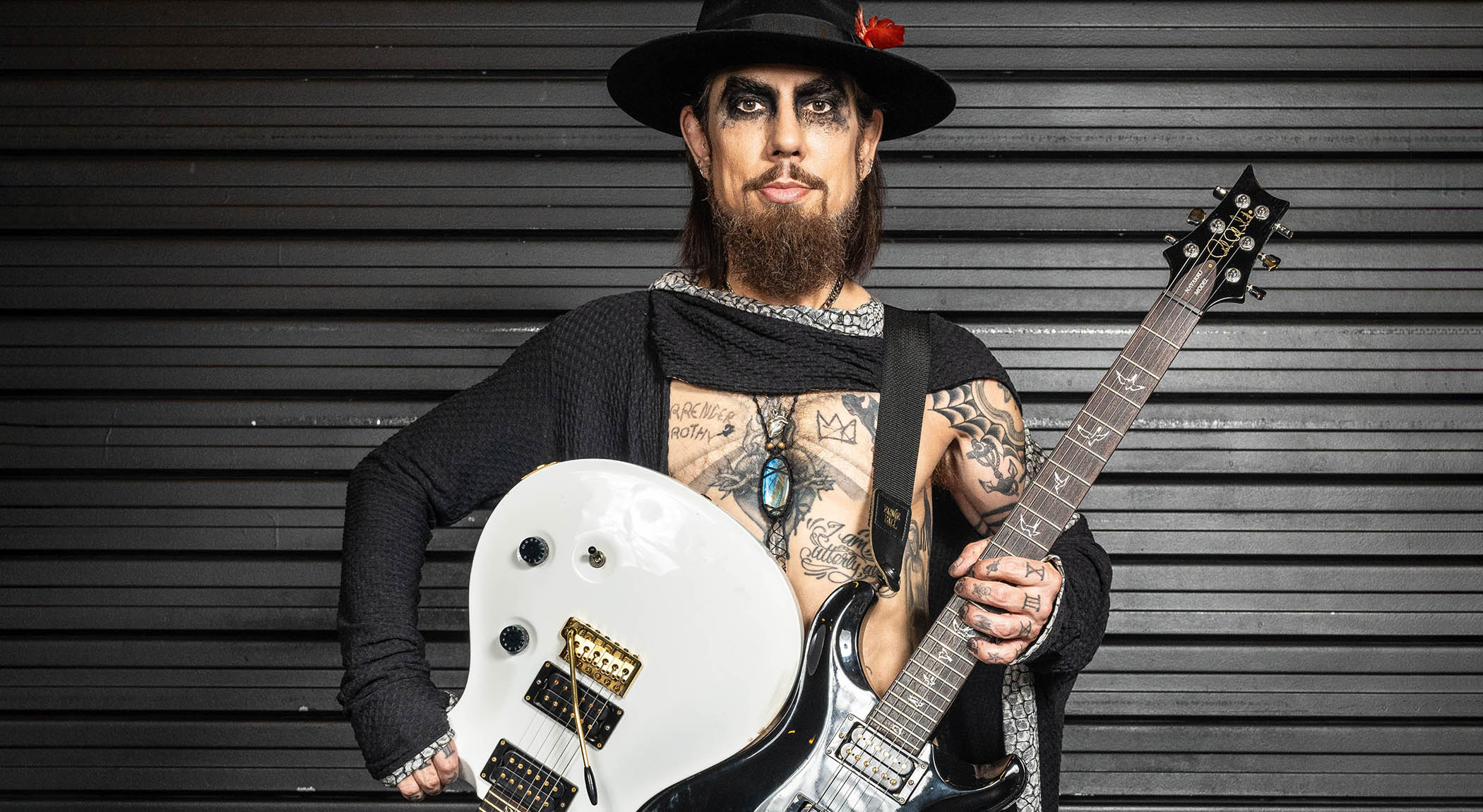
All the latest guitar news, interviews, lessons, reviews, deals and more, direct to your inbox!
You are now subscribed
Your newsletter sign-up was successful
It was all going so well. Dave Navarro had made his way back from a years-long battle with Long Covid to reclaim his place on stage beside Jane’s Addiction 1.0 bandmates Perry Farrell, Eric Avery and Stephen Perkins.
But “was” is the operative word. As of late September 2024 (press time for the issue of Guitar World in which this interview first appeared), things aren’t going so well. Jane’s Addiction had been stampeding across Europe and the U.S. with old friends Love and Rockets. New music was afoot in the seemingly (but not really) aptly titled Imminent Redemption, and the fans were loving it.
But Jane’s Addiction has always been a band bred through dysfunction, and this reunion based on brotherhood wasn’t any different.
The cracks were subtle at first, mostly consisting of Farrell struggling to keep pace live. But then the spacey rants and erratic onstage behavior started. Fan footage shows that Farrell, who openly admits to spending 40 years of his life loaded, was slipping a bit.
On September 10 in New York City, he told the audience he was struggling in terms of his vocals. After the show, Navarro took to Instagram, jokingly (but not really) referring to the performance as an “art” show.
But things went entirely off the rails in Boston on Friday the 13th, when Farrell started shooting a few knife-edged glances at Navarro, who mainly was minding his own business in Shredville. Things got weird during Mountain Song, when Navarro tried to keep Farrell on track and tapped him on the shoulder.
More Farrell eyeball daggers followed. The tension was palpable through the night’s 11th – and unexpectedly final – song, Ocean Size. Once again, Navarro was ripping it up and gave way to Farrell’s final angered grunts.
All the latest guitar news, interviews, lessons, reviews, deals and more, direct to your inbox!
Usually, these grunts would be directed toward the ether, but Farrell again turned his attention to Navarro, screamed, “Fuck you” and shoulder-checked the confused guitarist. Navarro kept calm, keeping Farrell at arm’s length. But that didn’t stop Farrell from swinging at Navarro’s chest.
If you’ve seen the footage, images of Navarro’s tech, Dan Cleary, bassist Avery and other stage crew gang-tackling Farrell are reminders of how sad the situation was, as is the sight of a confused Navarro gently placing his guitar down and walking off stage.
Two days later, Jane’s canceled their remaining 15 U.S. dates. Soon after, Navarro, Avery and Perkins collectively posted a statement on social media: “Due to a continuing pattern of behavior and the mental health difficulties of our singer Perry Farrell, we have come to the conclusion that we have no choice but to discontinue the current U.S. tour.
“Our concern for his personal health and safety, as well as our own, has left us no alternative. We hope he will find the help he needs. We deeply regret that we are not able to come through for all our fans who have already bought tickets. We can see no solution that would either ensure a safe environment on stage or reliably allow us to deliver a great performance on a nightly basis. Our hearts are broken. Dave, Eric and Stephen.”
As for Farrell, he posted a story on Instagram calling his actions “inexcusable,” while also apologizing to Navarro. None of it changed the fact that he crapped in the proverbial punchbowl, ruining a final chance at being seen as anything less than dysfunctional. At 65, once and for all, Farrell has confirmed he is indeed the problem.
A day after being assaulted, Navarro posted a picture of himself from the Boston show with an acoustic guitar that simply said, “Goodnight…” In the ensuing days, while musing on Walt Whitman’s Leaves of Grass, he said, “Perhaps it’s simpler to recognize when something is gone and learn from the magical lesson of grief rather than avoid it and remain in a consistent state of dissatisfaction.”
The company line is that Jane’s Addiction is on hiatus. But one would be remiss to buy that – especially after Navarro’s comments on Instagram after the September 18 release of the horribly timed new single, True Love.
“I am proud of the work we did on this song,” Navarro said. “But I am equally saddened by the fact that you will likely never hear it live. I am gutted that things ended this way and that so many jobs were lost as a result. May all of our hearts mend together.”
Before the latest episode of the Jane’s Addiction Dysfunction Show unfolded, Navarro had been open about having no idea if it would last. Was he offering up cryptic insight – as he often does – into the state of the band? Or was he simply speaking on experience?
“It could go on for five, 10 more years,” he said in late August. “Or it could be done in… I don’t know. Based on our history, if you look at the amount of times we’ve broken up… It’s like, ‘Don’t make plans. Just show up to rehearsal today.’”
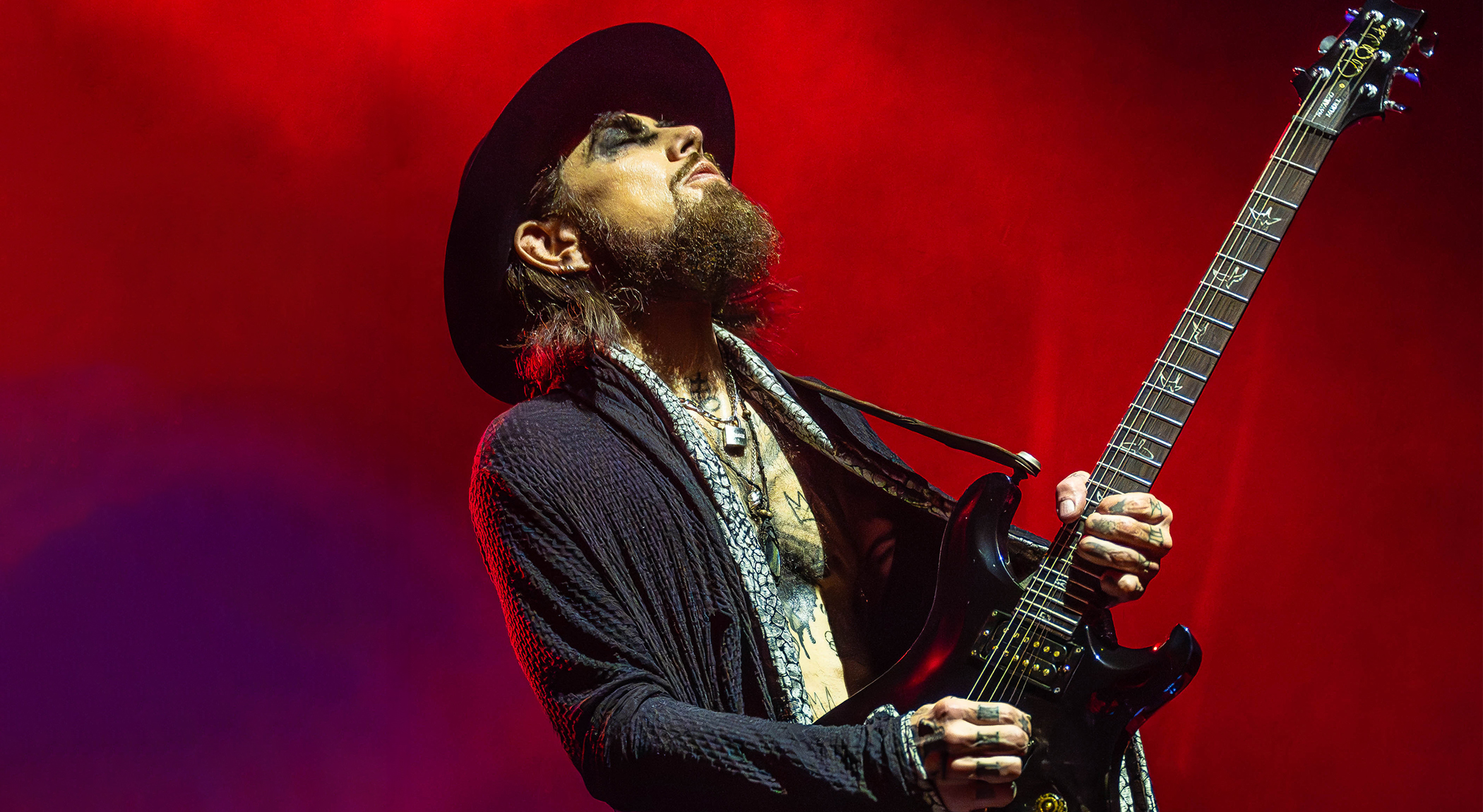
Navarro is understandably quiet right now. Odds are, there’s more to come in this developing story. Looking back on Navarro’s words as he dialed in with us just weeks before the event that halted the band, it’s hard not to be heartbroken.
“I think being at the age we are, it’s easier to let go of petty shit and focus on what matters,” Navarro said. “We’ve learned over the years that hanging onto the petty shit is nothing but a vibe killer and a band killer. None of us want to see that happen. We can’t be doing this forever, but we have a chance to do it again.”
Jane’s Addiction’s latest chance at “imminent redemption” and “true love” has been squandered. And this time, it looks like there’s no coming back. But when Navarro dialed in with GW back in August, he didn’t know that yet…
Over the summer, Jane’s 1.0 lineup wrapped up its first tour in years. How are you feeling?
“My initial feelings when we started up in Europe, you know, were really the first time I’d been back with the band for a couple of years. That was so complex; I was emotional. It was nerve-wracking and physically draining, but it was magical in the sense that we started out in a room that held maybe a couple hundred people.
“And with the original lineup and no production, it really felt like 1989 Jane’s Addiction. It had that feeling of where you’re looking over a cliff, and you want to see what’s on the ground, but you don’t want to fall, you know? That kind of nervous energy of something exciting happening. So that was really great.”
Getting back on the road in smaller venues probably made it easier to shake the rust off, too.
“Yeah, the shows in Europe were in relatively small rooms, so there was a real sense of tapping into the melancholy of the early days of this band.”
Jane’s is as much about a vibe as anything else. Having Eric Avery back in the band no doubt helps with that.
“Right. So it’s primarily because it was the original lineup with Eric Avery and me back together. We just had a blast. And to be honest, some of those shows were my favorite shows that we’ve ever done as Jane’s Addiction.”
Really? In an age where old-school bands are dropping like flies, and given the general volatility of the Jane’s experience, that’s great to hear.
“Those shows were moody and ambient and had very little production. It was mainly lights, like moods of lights rather than rock lights. We’d drench the stage in blue, play a song and just be a silhouette. It let the music speak and breathe; there were not a lot of antics. It was really magical.”
It wasn’t that way in the past?
“I think we’ve all kind of re-tapped into the music again in a way we hadn’t in a long time. For the last 20 or 30 years, we’ve been playing these songs, and it’s been great, but we’ve had a bunch of stuff going on with the lights and video. At a certain point, you get a little… it starts to feel redundant.
“And in the name of taking this thing back to the start and rebuilding not only the creativity but the relationships within the band, it makes sense that you’d strip Jane’s back to its core.
“Since it was the original lineup, we needed to strip away all the distractions so that it really felt like the early days when we’d be playing clubs in Hollywood. My very first show with Jane’s Addiction was in an abandoned warehouse, and maybe a couple hundred people were there. It was a word-of-mouth, downtown party. It’s been feeling like that.”
Is taking things back to the start, so to speak, tapping into emotions you haven’t felt in a long time?
I’ve been playing with Eric for 40 years, and the way he digs into the bass, the way his pick hits the strings, and the energy he puts out, you can’t compare it to anybody
“I’ve felt and heard the music in a different way than I had in a long time. We were really focused on that. This is a band that’s had five bass players; all of them are great, and all of them are different. But to be playing with Eric again – especially since I’ve been playing with him since I was 17. God, if that’s true, that’s 40 years.”
Listening back to Jane’s first two records, Eric’s bass might be even more important than your guitar.
“I’ve been playing with the guy for 40 years, and the way he digs into the bass, the way his pick hits the strings, and the energy he puts out, you can’t compare it to anybody. There’s tons of guys we’ve had who did very serviceable, great jobs, but I can tell the difference because I was there at the beginning. I’m like, ‘Oh, that’s how it’s supposed to go.’ He’s playing the same notes on the same frets in the same key at the same tempo, but it’s his hands that make a difference.”
Considering that, along with your health, do you feel ready for the upcoming U.S. leg?
“I’m really looking forward to bringing the same kind of enthusiasm and freshness to the States. We haven’t done that in a long time. We’ve toured a lot in the States, but in different configurations.”
There’s a lot of lore associated with what you’re doing. A lot of people didn’t think you’d do it at all. Have you had a moment to step back and reflect on what it’s taken to make Jane’s 1.0 a reality again?
“I don’t need to take a step back to be aware of that. It’s pretty easy to remember. [Laughs] When you look at other bands from our era, the fact that very few of them are lucky to have the original lineups or have all their members survive… I feel grateful for that. Whatever obstacles we’ve overcome, or I’ve overcome, I think it makes me appreciate it all that much more.”
I’m reading between the lines a bit here, but would you say you’re lucky to be alive?
“I certainly feel I’ve had a blessed life. In that same way, I’ve had somewhat of a cursed life. I think it evens out at the end of the day. All the experiences we’ve lived through and gone through shaped us into what we are today. You can’t really look back and regret things, or wish they went in a different direction because here we are. Those types of challenges inform your present and your future.”
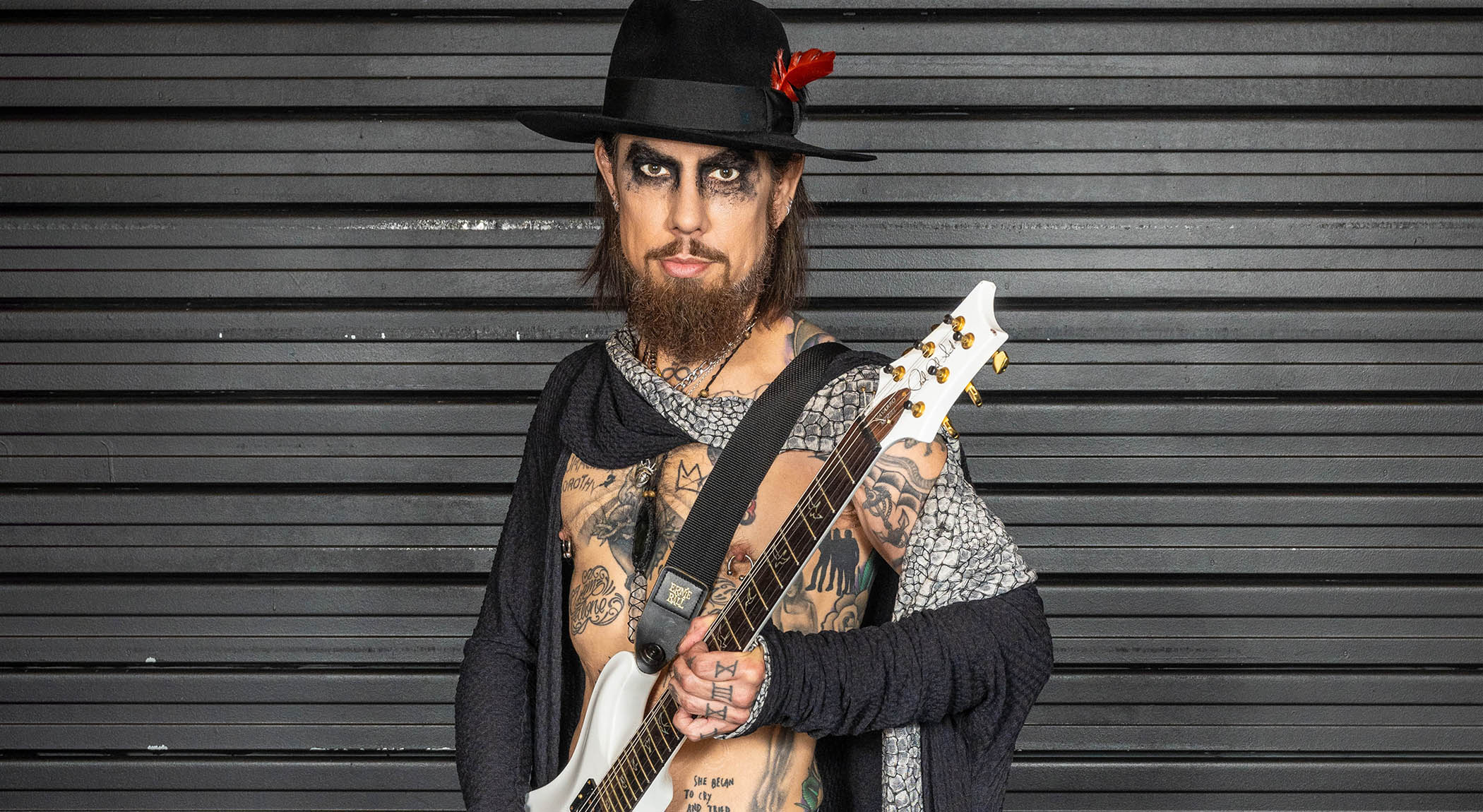
On the cursed side of things, you were laid up with Long Covid for two years. But on the blessed side, you lived to tell the tale.
“The fact that I’m back together with my old band after going through a pretty severe illness for a couple of years – I didn’t think I could come back at all! – that I’m able to do this is exciting, daunting and scary. But all in a very positive way.
“It’s like adrenaline, I guess you’d say. It’s going to be a rush and fun, but just jumping out is the part you’ve got to worry about. All these things are what shaped the new music we’re writing, like Imminent Redemption. And we have more material that’s going to come out.”
As a band, Jane’s has obviously had to put aside a lot of old stuff. Touring is one thing, but it must have been a new challenge to get together in a room and record.
“I don’t know if challenge is the right word; it’s very democratic. But I will say the songs are predominantly kicked off by Eric’s basslines. Once he puts a bassline down, it’s Jane’s Addiction. You take one of our songs and take the drums and guitars away but leave the vocals and bass, and it’ll still sound like Jane’s Addiction.”
Having not recorded with Eric for a long time, did it take long for the old chemistry to resurface?
“Our fluidity was still intact. It’s kind of like I found the musical partner I was supposed to find. Name any two bassists and guitarists, like John Paul Jones and Jimmy Page or John Entwistle and Pete Townshend; the way Eric and I work together has its own sound.”
So getting in the studio is still fun.
“Yeah, because it’s been fun and really collaborative. It’s my favorite part of the job. I like being creative. I like being in the studio, spending 12 hours there, working on something, trying out different things.”
Listening to Imminent Redemption, Jane’s idiosyncratic nature is there. The returns seem good, but there’s expectations of reforming the 1.0 lineup. Does that factor into your thinking?
“I don’t think it really enters into anybody’s head. We just try to come up with stuff we like. It’s really the same spirit we had when we wrote in 1986 and ’87. When Ritual came out in 1991, that was always the spirit.
“We’ve always wanted to push the envelope, but it wasn’t a conscious decision. What ended up being was all our influences – which are vastly different – came through as either cohesive material or clashed terribly. But that clash led to something new, fresh and exciting.”
You’re not compromising artistic integrity for what someone might want to hear.
“I can promise you that nobody said, ‘What would the fans want to hear from us today? Let’s think of something to play that they would like.’ We’re all in our 50s and 60s, and everything is streaming. The music business isn’t what it was, so the intention – which it always was – is to write songs we’re proud of.”
Don’t fix what’s not broken.
“When you think about Mountain Song, Stop, Been Caught Stealing, Jane Says or Three Days, none of them really have choruses. They have these repetitive parts that are singable and memorable, but they’re not like, ‘Here’s the chorus.’”
Anyone who has followed you knows you can cover any genre, so there must be a lot of satisfaction in the approach you’re describing as a guitarist. Do you gravitate toward certain tones?
“I feel like tones are really more representative of the moods. Whatever mood the song calls for, or what mood I’m feeling at the time of writing the part is going to dictate what kind of tonality I go for. I’m one of those guys who grew up on Jimi Hendrix, Jimmy Page, David Gilmour, Eric Clapton and Jeff Beck.
“Those were my guys when I was really young. I studied everything I could about them by dropping the needle, hearing something and trying to play it. I still go back to those guys as far as moods and tones.”
I hear everything from ambience to blues in your playing. But I also hear a ton of heavy metal.
“When I got into Pink Floyd, I became aware of ambience, space and the minimalistic approach. Gilmour would take a solo and hang on a single note with just enough vibrato to make it tear your heart out. That got my attention. But at the same time, I was heavily into Van Halen, Iron Maiden and early Metallica.”
Gilmour would take a solo and hang on a single note with just enough vibrato to make it tear your heart out. That got my attention
Is it true that Dave Murray’s sound is responsible for your use of delay?
You could say Dave Murray was a huge influence. There’s a song called Wrathchild from Killers, and it’s got this lead guitar with tons of echo. I’m pretty sure that made me go, ‘Oh, that should be part of my sound.’ If you put on that song, you’ll hear what I’m talking about.”
Who is Dave Navarro as a guitarist in 2024?
“I love simplicity and how you can play a riff in a modal way off a tone. I just love arpeggiated, memorable melodies and a lot of hooky, simple lines that aren’t really technically proficient but powerfully effective on an emotional level.
“I started gravitating in that direction, but I never stayed in one direction long enough to become a master of a style. I don’t think I’m a great shredder, but I can shred a little bit. I’m not an ambient guitar player, but I can touch into some ambience. I don’t think I’m an experimental guitar player, but I definitely experiment with all kinds of weird devices and sounds.”
Three Days is a great example.
“Yeah, that starts off with an arpeggiated picking part, and it sounds very English to me. And then it changes and modulates, going into different parts before I end up doing a five-minute solo that goes into a completely different part. That song almost goes heavy metal and then goes into a Grateful Dead kind of jam.
“And it’s got a glorious outro with wings spread wide open; I get to touch on different styles. That song is our masterpiece because of the emotional impact, and the instrumentation is special.”
Nothing is overplayed or overdone.
“That’s exactly the way it’s supposed to be. I learned at an early age that just because there’s space in the music doesn’t mean I have to fill it up with a bunch of sound. If you leave space and then come in with sound, there’s impact. If you don’t have any space, there’s no impact and no memorable moments.”
You’ve been away for some time and working on other projects outside of music. I think people’s perception of you as a guitarist has shifted because of those things.
“It’s not really in my mind, but I understand what you’re speaking to. Coming out of the L.A. underground, we didn’t expect to be on the radio. We didn’t expect to headline Lollapalooza. We didn’t know what was gonna happen. We were just a bunch of kids, and as the years went on, I got older, wound up in a famous marriage and was on a reality show about that marriage.
“I found myself on TV, which was essentially hosting a game show [Ink Master], though I had a great time doing it. But I think some of those decisions and some of those choices kind of eclipsed the perception out there of me being a musician. Because now, the band’s in the airport, and people are walking up to me going, ‘You’re the Ink Master guy, right?” You know what I mean?’”
This feels like a time when you have a chance to reclaim a spot at the forefront of the guitar scene.
“I think all that kind of watered down any musical impact I may have had. It’s been nice to simply be focusing on my two true loves: guitar and painting. Funny thing is I don’t like being on TV. I don’t like having cameras playing.”
So why did you do it?
“I’m a great believer that when opportunities come, give them a whirl. Why not? But what I love to do most is play music and paint. So now, that’s what I’m doing at this stage of my life. I can’t speak for anybody else’s perception, but I can certainly say it’s my intention to make the guitar and music the forefront of my journey. And I absolutely hope that helps touch people.”
Given that, the idea that you thought you might never come back at all must have been heartbreaking.
“Yes. And there were two factors involved in that. One is that I got hit with Long Covid, which completely zaps you of energy and causes intense fatigue. It made doing a two-hour show impossible. And then, the loss of [Foo Fighters drummer] Taylor Hawkins, who I had just finished an album with. After we lost him, I couldn’t pick up the guitar. I just couldn’t do it.”
Being that sick alone is really, really, really tough. It’s tough on the sick person and on their loved ones. It’s tough on the psyche and emotional wellbeing
At a time when you’d think your guitar would be an outlet for you, you put it down.
“When you’ve got emotional carnage happening and the physical malady I had, when it came to my instrument, I had to grieve it for a while. I was like, ‘Oh, well. I guess I had my run. I’m lucky for the run I had. This is the next chapter of my life… watching documentaries about World War II in my bedroom until I die.’”
You truly didn’t know if you’d play guitar again?
“I just didn’t really know. Being that sick alone is really, really, really tough. It’s tough on the sick person and on their loved ones. It’s tough on the psyche and emotional wellbeing. Not being able to participate in the world or your life like you used to… I was always very busy. To then come to a complete, grinding halt with two dramatic events; I was in a really bad place for a long time.”
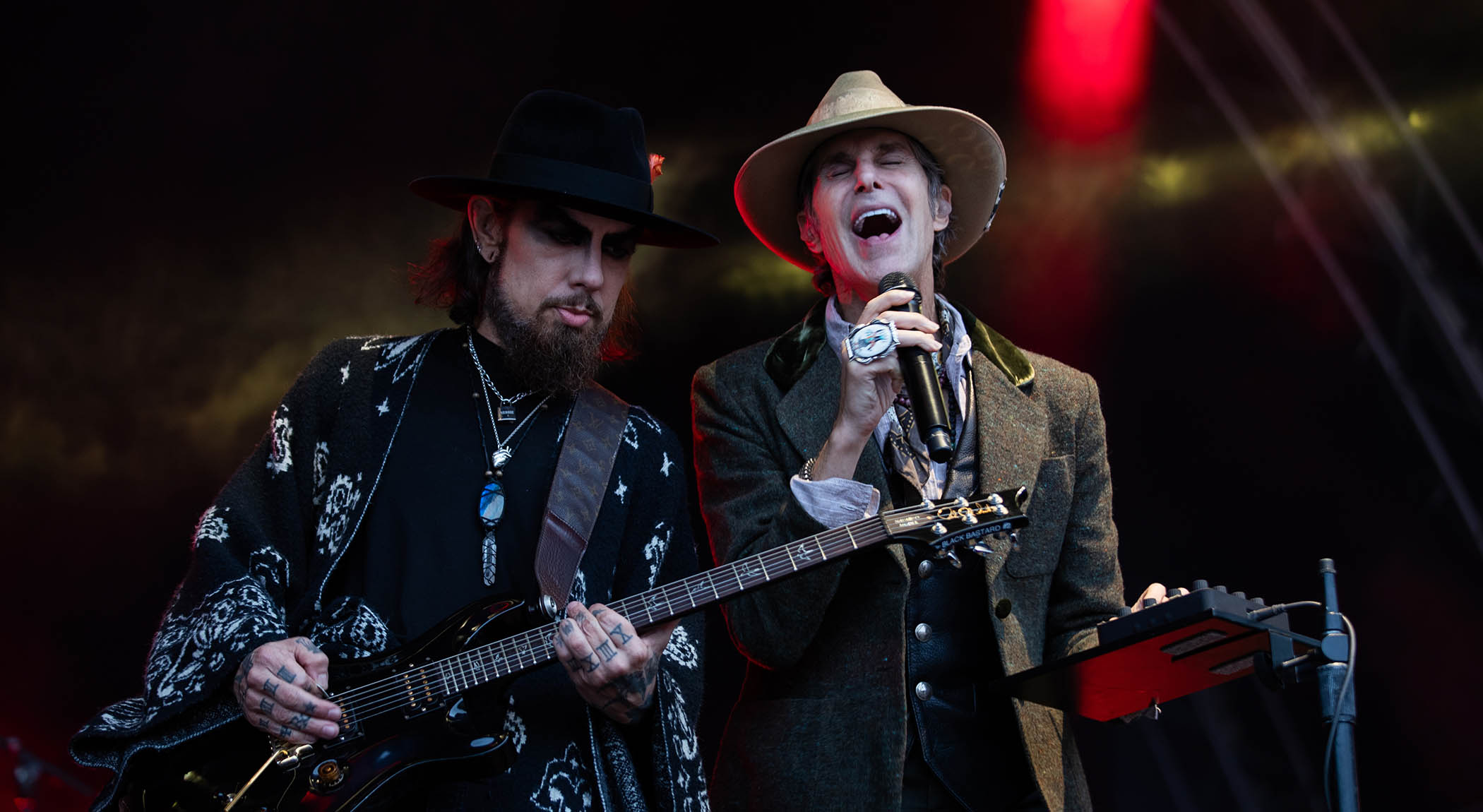
Was it hard to watch Jane’s go on tour without you during that period?
“As I started getting a little bit better, the guys in Jane’s called and said, ‘We want to do this tour, go to South America’ and all this stuff. I was like, ‘Guys, I’m in no shape to do that. I’m sorry. You’ve got my blessing to find somebody to fill in.’ I didn’t want my circumstances to affect their careers or stop them from doing what they were put on this planet to do.
“So the band connected with Josh Klinghoffer and Troy Van Leeuwen, both of whom I fortunately love as far as playing and their approach. They did a great job. But that almost kinda solidified it to me, like, ‘Yeah, that chapter’s over.’ I was grieving. I was grieving the band; I was almost making peace with it.”
How did you pull yourself out of that to where you could play guitar again?
“I was also kind of relieved on some level, like, ‘Okay, now this is done.’ I slowly started playing guitar, getting interested in other players I’d never paid attention to and listening to Steely Dan, songs I’d never learned.
“It kind of became a hobby, and that’s how I got a guitar back in my hand. Next thing I knew, I was watching YouTube tutorials and interviews, ordering effects and going down rabbit holes of Eddie Van Halen, Gilmour and Hendrix.”
When did you decide to rejoin Jane’s?
“In doing all that research, I got re-inspired to play guitar. Then, at that time, the guys were back from the tour and were in the studio. They said, ‘If you want to come down for a day, just to see if anything piques your interest… no pressure.’ I was like, ‘You know what? It’s time. It’s been about two years; what’s the harm? It’s just an afternoon.’”
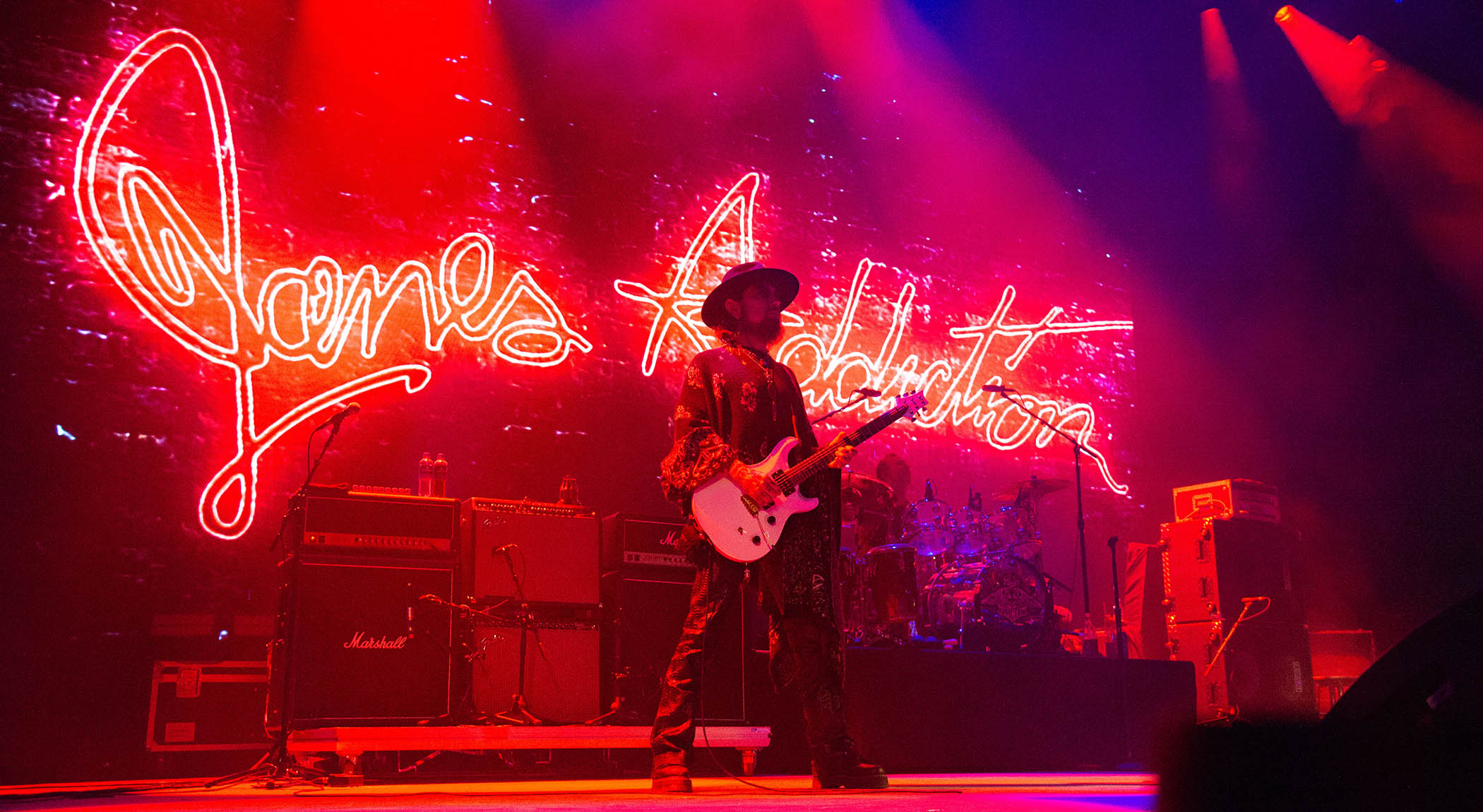
Was your health still an issue?
“I just kind of said, ‘I’m gonna push myself as far as I can while I’m here. If a day comes when I can’t do this anymore, I’ll deal with it. But for the time being, let’s just stay put and keep doing what we’re doing.’ I also noticed that being in the studio, playing guitar and trying to create prevented me from looping in my brain about my current condition.”
You got through it and this recent tour. Where’s your health at now?
“As it turns out, I was able to maintain [on] through the recording sessions. The next step was to stand up for two hours and play some songs. We booked a room to rehearse for a couple of weeks, and I was like, ‘Wow, this sounds good.’
“I was surprised and thought, ‘I have the strength for this.’ I didn’t know if I could do it, but I said, “I’m gonna go for it and see what happens. It’s like we were on autopilot. I still gotta be careful. I still have some residual fatigue, but for the most part, I’m pretty good. I’m really proud of the music we’re making and love playing with these guys I’ve known all my life.”
You’ve survived a lot of volatility, as has Jane’s. What’s your outlook on life and on this band?
“My outlook as a guitar player right now is to serve the other three members I’m working with, have fun and really enjoy the gift of this instrument. It’s been exciting and fun and a potential trainwreck onstage. [Laughs]
“Nine times outta 10, it ends up being something cool, and if it’s a trainwreck, so be it. It keeps us on the edge of that cliff I mentioned earlier. I just want to make it fun. This is a gift that I lost for a couple of years.
“And as far as the band, I don’t know. I’m focused on this tour and trying to bring the best performances and sonic landscapes we can bring. I’m grateful. With this band, you learn not to make plans, like, ‘Let’s not plan anything. Let’s just do what we’re doing.’ That’s where I’m at.”
Andrew Daly is an iced-coffee-addicted, oddball Telecaster-playing, alfredo pasta-loving journalist from Long Island, NY, who, in addition to being a contributing writer for Guitar World, scribes for Bass Player, Guitar Player, Guitarist, and MusicRadar. Andrew has interviewed favorites like Ace Frehley, Johnny Marr, Vito Bratta, Bruce Kulick, Joe Perry, Brad Whitford, Tom Morello, Rich Robinson, and Paul Stanley, while his all-time favorite (rhythm player), Keith Richards, continues to elude him.














